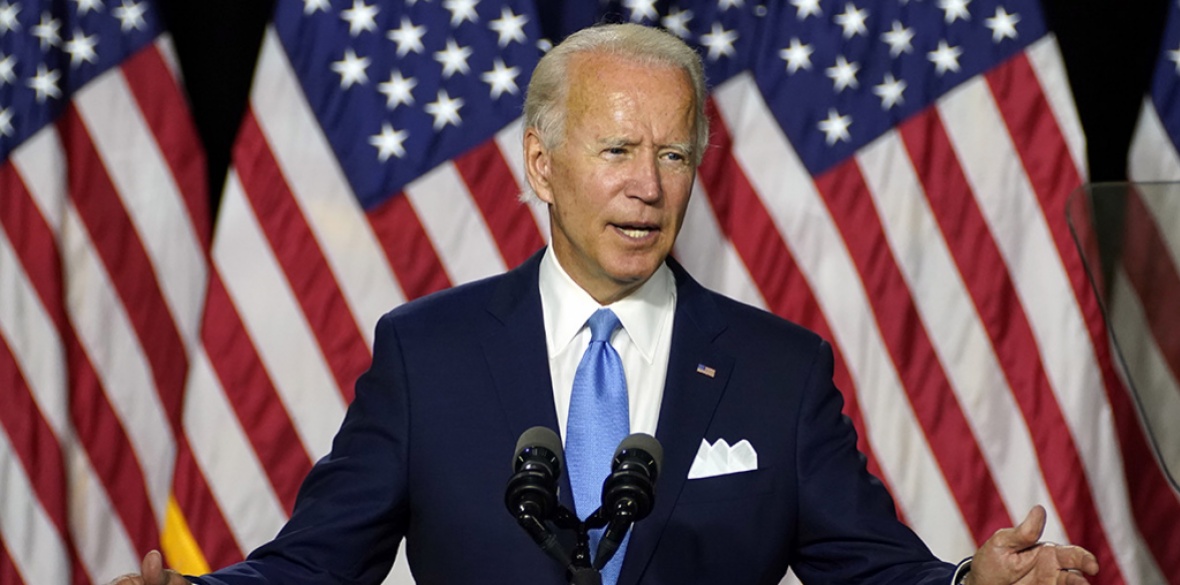This is the last article you can read this month
You can read more article this month
You can read more articles this month
Sorry your limit is up for this month
Reset on:
Please help support the Morning Star by subscribing here
THE Democratic Party presidential candidate Joe Biden is trying hard to present himself as a man of peace and the person to bring an end to continuous wars between the US and other states.
Yet his track record shows him as an enthusiastic warmonger who has surrounded himself with political lobbyists and campaign donors with links to the US military-industrial complex.
Biden voted for war with Iraq in 2003. But he did vastly more than just vote for the war.
When the war was debated and then authorised by the US Congress in 2002, Democrats controlled the Senate and Biden was chair of the Senate committee on foreign relations.
Biden himself had enormous influence as chair and argued strongly in favour of the 2002 resolution granting president George W Bush the authority to invade Iraq.
He was able to choose all 18 witnesses in the main Senate hearings on Iraq. And he mainly chose people who supported a pro-war position.
They argued in favour of “regime change as the stated US policy” and warned of “a nuclear-armed Saddam sometime in this decade.”
They contended that Iraqis would “welcome the United States as liberators,” that Iraq “permits known al-Qaida members to live and move freely about in Iraq” and that “they are being supported.”
The lies about al-Qaida were perhaps the most transparently obvious of the falsehoods created to justify the Iraq war.
Saddam Hussein ran a secular government and had a hatred, which was mutual, for religious extremists like al-Qaida.
But Biden did not choose from among the many expert witnesses who would have explained that to the Senate, and to the media.
Biden’s selling points as a candidate often lead with his reputation for foreign-policy experience and knowledge.
But Iraq in 2002 was devastated by economic sanctions, had no weapons of mass destruction, and was known by even the most pro-war experts to have no missiles that could come close to the United States.
The idea that this country on the other side of the world posed a security threat to the US was more than far-fetched.
Senator Dick Durbin, who sat on the Senate intelligence committee at the time, was astounded by the difference between what he was hearing there and what was being fed to the public.
“The American people were deceived into this war,” he said.
The resolution granting Bush the authority to start that war, which Biden pushed through the Senate, was a major part of that deception.
So, too, was the restricted testimony that Biden allowed.
The resolution itself contained deceptive language about a number of pretexts for the war, including al-Qaida and weapons of mass destruction that Iraq did not have.
The Iraq war has generally been seen as one of the worst US foreign-policy blunders in decades.
It fuelled the spread of terrorism and destabilised the Middle East and parts of north Africa.
“Isil is a direct outgrowth of al-Qaida in Iraq, that grew out of our invasion,” noted president Barack Obama.
More than 4,500 US soldiers, and nearly as many US military contractors, lost their lives and tens of thousands were wounded, with hundreds of thousands more suffering from post-traumatic stress disorder.
Estimates of Iraqi deaths run as high as a million.
The narrative at the time in the US was that a quick and decisive victory in the heart of the Arab world would send a message to all countries, especially to recalcitrant regimes such as Syria, Libya, Iran or North Korea, that US hegemony was here to stay.
Put simply, the Iraq war was motivated by a desire to (re)establish US standing as the world’s leading power and respond to Russia and China’s increasing military and economic prowess.
Biden repeated false intelligence claims that Saddam Hussein possessed chemical and biological weapons and was seeking nuclear weapons, and therefore was a threat that had to be “eliminated.”
“Nine months ago, I voted to use force and I would vote that way again today,” Biden said in a July 2003 speech at the Brookings Institution.
In early January 2003, ahead of secretary of state Colin Powell’s presentation to the UN security council, Biden said war with Iraq appeared near inevitable.
In a speech to the New Castle County Chamber of Commerce in February 2003, Biden said: “I supported the resolution to go to war. I am not opposed to war to remove weapons of mass destruction from Iraq.”
The administration was clearly and openly moving towards war with Iraq. Biden did little to slow down Bush’s momentum.
In May 2007, the Senate voted on a $120 billion spending bill that included $100bn for Iraq and Afghanistan.
Biden, chairman of the foreign-relations committee, voted for it.
Obama said: “I opposed this war in 2002 precisely because I feared it would lead us to the open-ended occupation in which we find ourselves today.
“We should not give the president a blank cheque to continue down this same, disastrous path.”
Just 14 senators opposed the measure. After 30 years of carnage, civil wars, millions of deaths and the subsequent Middle East turmoil since the first Gulf war in 1990, Biden is trying to recast himself as a man of peace when he has blood all over his hands.










